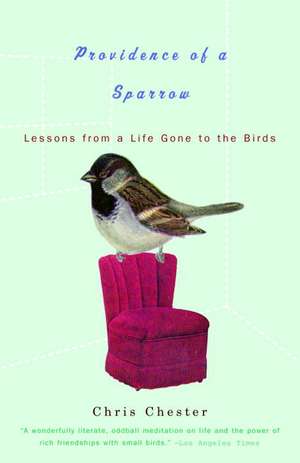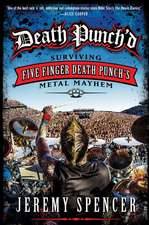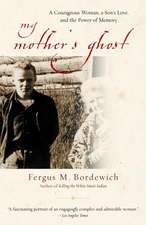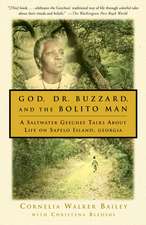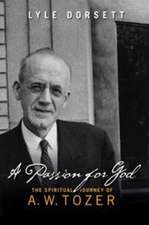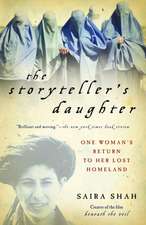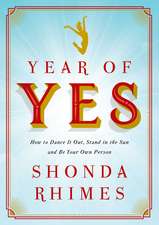Providence of a Sparrow: Lessons from a Life Gone to the Birds
Autor Chris Chesteren Limba Engleză Paperback – 31 mar 2004
B fell twenty-five feet from his nest into the life of Chris Chester. The encounter was providential for both of them.
B and Chester spent hours together playing games like bottle-cap fetch or hide-and-seek. They learned “words” in each other’s vocabularies. B developed a fetish for nostrils and a dislike of the color yellow. He grew anxious if Chester came home late from work. At bedtime he would rub his sleepy eyes on Chester’s thumb and settle to sleep in his palm. Chester ended up turning part of his house into an aviary and adjusting his social life to meet B’s demands. This was a small price to pay, though, for the trust and comfort of a twenty-five-gram friend who brought joy and wonder back into his life.
Preț: 89.50 lei
Nou
Puncte Express: 134
Preț estimativ în valută:
17.13€ • 17.84$ • 14.24£
17.13€ • 17.84$ • 14.24£
Carte disponibilă
Livrare economică 20 ianuarie-03 februarie 25
Preluare comenzi: 021 569.72.76
Specificații
ISBN-13: 9781400033850
ISBN-10: 1400033853
Pagini: 304
Dimensiuni: 134 x 206 x 17 mm
Greutate: 0.22 kg
Ediția:Anchor Books.
Editura: Anchor Books
ISBN-10: 1400033853
Pagini: 304
Dimensiuni: 134 x 206 x 17 mm
Greutate: 0.22 kg
Ediția:Anchor Books.
Editura: Anchor Books
Notă biografică
Chris Chester is an electronics technician and writer. He lives in Portland, Oregon.
Extras
1
B
The kingdom of ornithology is divided into two departments-birds and English sparrows. English sparrows are not real birds, they are little beasts.
-Henry van Dyke, American Ornithology for the Home and School
I did wonder, if English sparrows were such bad birds, how they had gotten to America in the first place. To hear my father talk, the sparrows might have been delivered to the new world by the devil himself.
-Calvin Simonds, Private Lives of Garden Birds
". . . a whole room to a bird. My, my."
-Avis
Mornings begin with "war bird." usually. sometimes he's not in the mood or I can't deal with it, drugged as I am from too little sleep, trying to reacquaint myself with the rigors of consciousness, confused by sunlight flouncing through the windows. But B's desperate when it's spring and swoops the room, turning, as Yeats would have it, in a widening gyre. Up to the mirror, tail flicking he checks, I think, his look. I move to the bed and he to the top of the towel-draped television. That tail: flick, flick, flick. Wings akimbo, beak parted a little, he assesses my opening gambit in a game that is our first rite of the day. "Bad, messy bird," I say, sweeping my hand back and forth across the bed. "Toss him outside; that's where he belongs. Just look at this room; germs, poop, and seed everywhere. To hell with birds, especially house sparrows." More flicks, a quick evacuation to lighten his load, and down he bears in a rush of wings, chirping, nipping my fingers, following quickly and precisely whatever reversals and arcs I make with my hand. I surrender at last, chastened for my slander. B struts atop my lifeless fingers, savoring his win. He dances and bows, chirps and pants. "Fierce, brave bird," I say, "you've slain your enemy, you've bested the foe."
He flies to his water dish to drink, and I sit on the little couch by the window. He'll join me presently and preen, working wing feathers first and then his black bib. Every few seconds he raises his head, scanning for cats and hawks that will never come. Small creatures are cautious, the burden of being prey seldom laid down. During his first year he would flinch when light, glinting from a passing car, moved across the ceiling stirring racial memories of death from above. He has since learned to ignore it. He stretches his wings and combs them with his toes, wing and leg extending completely-a movement that has about it a sense of tai chi forms perfectly rendered. Often he sits on my shoulder to do this, just as often in the palm of my hand or perched on a finger. I can see his tongue, a pointed, triangular affair, working the plumes into the svelte vanes that form each contour feather. His beak reseals the barbules by zipping them together.
His grooming habits are as fascinating to me now as when I first became privy to them. Since his arrival as a naked blob of flesh in my flower beds, he's claimed my attention in a way that few other things ever have. I may be adrift in a limitless universe, but this bird on my shoulder drifts with me. At least once a day I catch him looking at his feet as if he's noticed them for the first time. Three toes in front, one in back, they seem (measured in human terms) large for his body. He looks at his feet, and I look at him, a circumstance more remarkable to my here-and-now than a billion galaxies spiraling outward to some unfathomable denouement. Two citizens of a shared reality eyeing one another's improbable fortune.
A reality my friends find puzzling and my relatives, what's left of them, an eccentric aberration from doting on quadrupeds. My family was always firmly rooted in the feline camp. We were "cat people" spanning four generations, at least. My grandmother's canary and one or two preliminary parakeets she owned were, aside from an occasional dog, the only deviations from our love affair with cats. The first I remember was Elizabeth, a gray ill-tempered menace given to ambushing ankles, shredding expensive draperies, and biting everyone but my father. She disappeared (in answer to my mother's prayers, I suspect) the spring I turned four. The last was sleek, black epileptic Barney whom I discovered in our yard one summer while I was home from college. He was about seven weeks old and using our hedge as a fort from which he'd now and then debouch. Too fey to beg for food, he floated out of reach on the periphery of our vision until I made a contorted leap from a lawn chair and nabbed him skirting by. A few elastic ounces of fur and bone, he squirmed hissing from my hands and fell head first to the paving stones below. We always wondered if his infrequent grand mal seizures were a result of that no doubt painful blow to the skull. He became a good friend and a great favorite of my mother. When she was dying, he spent most days by her side, curled on her bed like a narcoleptic sentinel. He lived another eight years until, his kidneys failing, my father held him in a towel and wept as the vet rang the curtain down.
Prufrock might have been better served measuring out his life in the lives of his pets rather than with coffee spoons. Or, maybe not. I've lost eating utensils and remained unshattered. It is clear to me that a great dividing line runs through my time: Before B and after B.
====
I wasn't expecting a life-altering event to come my way, a deus ex machina to drop from the stage rafters and resolve issues of meaning and direction in a world I've frequently thought in need of less wrenching plots. Nor is this what B represents. In fact, to the extent I view him metaphorically, it is as a model of self-possession unblemished by artifice or facade. Like the Old Testament God he might with perfect justice say, "I am that I am." Deities and beasts inhabit themselves free from the heartache of coveting a plausible alternative; humans mostly work on their masks. Having finagled our way to the top of the food chain, we find the view from the summit soothing and assume mastery for ourselves of all things seen and unseen. B reminds me gently I'm more or less an idiot. When he brings a toy, drops it in my hand, and nudges around asking for a game, I think of Thoreau's words on being affected by a mosquito's faint hum, "There was something cosmical about it; a standing advertisement, till forbidden, of the everlasting vigor and fertility of the world." Once in a while the tent flap falls open. If these glimpses are fraudulent, our spiritual leg pulled by renegade neurons, they're delusions worth cultivating when they point the way, however briefly, past dishes in the sink and beyond all the quotidian fretting that gobbles up so much of our lives. I may be misinformed, but I believe my time with B is filled with such glimpses. I hate to describe these moments as "transcendent" or "numinous," so let's just say they've been tranquil enough to hint at the divine. Very different from an underwear-staining encounter with a twitchy god in a flaming bush (an image of which I formed from the benign Episcopalianism in which I was raised) or from the exhilarating but frightening suspicion that creation itself is too unlikely to be true. As a child, I'd lie in bed and sense in the filigree of lapsing consciousness that comes with approaching sleep an unsettling enormousness stationed forever beyond reach or comprehension, a barrier, I now realize, of metaphysical imponderables welded together to form an overwhelming composite of everything I will never know. Many of my concerns fell into the "expanding universe" category like those plaguing Woody Allen's prepubescent alter ego in Radio Days. I was a depressed kid.
When B arrived, I was forty-one years old, engaged to Rebecca, and hoping to rise finally above the low-level angst I'd been living with all my life. I avoided taking antidepressants (viewing their use as vaguely unsportsmanlike), as if failing to overcome depression without chemical assistance were tantamount to cheating, an admission of failure on the part of my psyche to configure itself into something healthier. Better, it seemed, to endure a known quantity than to muck about inducing change on that little island of awareness I take to be myself. After all, depression can be as much a defining characteristic as any other mental state. When it came to taking pills, the old philosophical chestnut seemed to apply: "If I were someone else, would I still be me?" I knew all this to be nonsense, but early conditioning dies hard. My father said to me when I was eleven or twelve, "What have you got to be depressed about?" I had loving parents, a roof over my head, and food in my stomach. The logic of his question seemed unassailable. I don't think either of my parents ever considered or were even aware of the distinction between situational depression (Granny just died in a silo explosion) versus the free-floating variety (this beautiful, sunny day appears to me a dark emblem of what, exactly, I cannot say).
Baseline for me had always been slightly below sea level. Too modest a depth in which to drown but deep enough to suggest what life must be like for those truly debilitated by anxiety and sadness that doesn't go away. I suspect my mother and I had this in common and that her rather nonspecific complaints of "not feeling well" I recall from childhood were tendrils snaking out from that buried root. She died of cancer when I was twenty-three, long before I developed enough compassion and insight to know her better. A pity, it's likely we'd have found lots to discuss.
B, for example. The joy I take in him mingled with undercurrents of foreboding over that inevitable time when I shall lose him. If nothing else, depression teaches understanding of brevity as an ironic constant-that what endures also flits by, that if we bear the mark of Cain it is in our awareness of temporary gain followed by eternal loss. The trick is to largely ignore this fact along with the fear of losing who and what we love, even those things likely to outlast us. Goethe's Faust has it about right when he says:
Though nothing happens, dread you always feel,
What you never lose, you mourn throughout your life.
====
The average American sees thousands of B's kind every year: house sparrows, English sparrows, or, as the Audubon people refer to them, "Pesky Brown Jobs." (Native sparrows such as Vesper sparrows, chipping sparrows, lark sparrows, etc., merit the less pejorative appellation "Little Brown Jobs") Passer domesticus: small, drab birds chattering in bushes. Inexorable hordes of bird-feeder plunderers. Gamins, tramps, hoodlums. Dirty, ubiquitous beggars, sidewalk-fouling avian thugs that push out "desirable birds" and steal when they can the souls of children. In league with starlings and pigeons, the other winged felons flapping through our cities, they work fast-food parking lots and city parks. They infest every neighborhood and build in every cranny their inelegant nests. Bane, pariah, miscreant. Disease-carrying vermin, parasite-ridden destroyers of crops and the American way of life. Antichrist with a beak. This from Birds of America published in 1936 and edited by T. Gilbert Pearson: "The English Sparrow among birds, like the rat among mammals, is cunning, destructive and filthy." In a used bookstore some years ago, I ran across the beguiling title Befriending Backyard Animals. Checking the index for sparrow, house, I was led to a four-page entry devoted to killing them.
B and I move together well. From long association, I've developed what Rebecca and I refer to as "B Consciousness," a state of being (pun intended) formed around the principle of never shifting my weight unless I know exactly where the bird is-an ethic that can be difficult to impress upon visitors: No casual sitting down, standing up, or re-arranging your ass on the sofa. No heedless sallying forth. From B's point of view our physical construction must seem more than a little freakish: Great lumbering things thousands of times his mass. No wings, knees inverted wrongly, the agility of boulders. He, on the other hand, is less than six inches long, weighs twenty-five grams, and trusts me completely. That I've clocked him moving near the speed of light introduces a troublesome variable. At rest he can be invisible, seemingly able to blend into any background. Time and again I've looked right at him and been unaware of the fact.
Eager to hop onto my hand or up to my shoulder, B is generally waiting on the screen door frame as I enter his room. If not, I direct my gaze to the hilt of the sword that hangs on the wall to the left, or to the ceramic gremlin on the side of the bookcase, or to the plastic container where Cheerios are kept. But never to either of the ficus trees that form the primary sources of flora in his room. In contradiction of Robert Louis Stevenson's assertion that "trees are the most civil society," B avoids them consistently, as if landing in one would violate a sacred oath or point of honor. We thought he would like trees, that they would make a nice counterpoint to the human conventionality of the room itself, cater to the avian imperative to perch aloft and be hidden. A similar thing happened with the tray I filled with organic topsoil and presented thinking he'd use it for the kind of dust bathing that wild sparrows enjoy. No sale. Nor did he approve of a planter of sprouts I furnished in the mistaken belief that he'd enjoy having fresh greens to nibble. This, like the trees, affronted his urbanity. I apologized eventually and removed it.
B lies drowsing in my hand. He opens and shuts his eyelids slowly and yawns in bird time (avian yawns happen quickly, unlike our protracted, toothy gapes), his head droops and nods as if he's fighting the effect of a long-winded sermon. He eases into his nap, scapular feathers fluffed and forming a mantilla into which he may decide to tuck his beak. Even in the weak winter light seeping into the room, his colors astonish me. Russet brown and tan, silver, black, white, and gray. Other hues resistant to naming. No ruby of the hummingbird's throat nor blue jay iridescence, no rioting with the spectrum as some parrots do. His are the shades of subtle intimation, the perfection of understated tones. I've held him to my ear as he sleeps and heard his heart's tarantella try to outpace the same eternity overtaking us all. It is difficult for me to understand the vehemence with which these birds are detested. Since my association with B began, I find it increasingly difficult to hate much of anything.
B
The kingdom of ornithology is divided into two departments-birds and English sparrows. English sparrows are not real birds, they are little beasts.
-Henry van Dyke, American Ornithology for the Home and School
I did wonder, if English sparrows were such bad birds, how they had gotten to America in the first place. To hear my father talk, the sparrows might have been delivered to the new world by the devil himself.
-Calvin Simonds, Private Lives of Garden Birds
". . . a whole room to a bird. My, my."
-Avis
Mornings begin with "war bird." usually. sometimes he's not in the mood or I can't deal with it, drugged as I am from too little sleep, trying to reacquaint myself with the rigors of consciousness, confused by sunlight flouncing through the windows. But B's desperate when it's spring and swoops the room, turning, as Yeats would have it, in a widening gyre. Up to the mirror, tail flicking he checks, I think, his look. I move to the bed and he to the top of the towel-draped television. That tail: flick, flick, flick. Wings akimbo, beak parted a little, he assesses my opening gambit in a game that is our first rite of the day. "Bad, messy bird," I say, sweeping my hand back and forth across the bed. "Toss him outside; that's where he belongs. Just look at this room; germs, poop, and seed everywhere. To hell with birds, especially house sparrows." More flicks, a quick evacuation to lighten his load, and down he bears in a rush of wings, chirping, nipping my fingers, following quickly and precisely whatever reversals and arcs I make with my hand. I surrender at last, chastened for my slander. B struts atop my lifeless fingers, savoring his win. He dances and bows, chirps and pants. "Fierce, brave bird," I say, "you've slain your enemy, you've bested the foe."
He flies to his water dish to drink, and I sit on the little couch by the window. He'll join me presently and preen, working wing feathers first and then his black bib. Every few seconds he raises his head, scanning for cats and hawks that will never come. Small creatures are cautious, the burden of being prey seldom laid down. During his first year he would flinch when light, glinting from a passing car, moved across the ceiling stirring racial memories of death from above. He has since learned to ignore it. He stretches his wings and combs them with his toes, wing and leg extending completely-a movement that has about it a sense of tai chi forms perfectly rendered. Often he sits on my shoulder to do this, just as often in the palm of my hand or perched on a finger. I can see his tongue, a pointed, triangular affair, working the plumes into the svelte vanes that form each contour feather. His beak reseals the barbules by zipping them together.
His grooming habits are as fascinating to me now as when I first became privy to them. Since his arrival as a naked blob of flesh in my flower beds, he's claimed my attention in a way that few other things ever have. I may be adrift in a limitless universe, but this bird on my shoulder drifts with me. At least once a day I catch him looking at his feet as if he's noticed them for the first time. Three toes in front, one in back, they seem (measured in human terms) large for his body. He looks at his feet, and I look at him, a circumstance more remarkable to my here-and-now than a billion galaxies spiraling outward to some unfathomable denouement. Two citizens of a shared reality eyeing one another's improbable fortune.
A reality my friends find puzzling and my relatives, what's left of them, an eccentric aberration from doting on quadrupeds. My family was always firmly rooted in the feline camp. We were "cat people" spanning four generations, at least. My grandmother's canary and one or two preliminary parakeets she owned were, aside from an occasional dog, the only deviations from our love affair with cats. The first I remember was Elizabeth, a gray ill-tempered menace given to ambushing ankles, shredding expensive draperies, and biting everyone but my father. She disappeared (in answer to my mother's prayers, I suspect) the spring I turned four. The last was sleek, black epileptic Barney whom I discovered in our yard one summer while I was home from college. He was about seven weeks old and using our hedge as a fort from which he'd now and then debouch. Too fey to beg for food, he floated out of reach on the periphery of our vision until I made a contorted leap from a lawn chair and nabbed him skirting by. A few elastic ounces of fur and bone, he squirmed hissing from my hands and fell head first to the paving stones below. We always wondered if his infrequent grand mal seizures were a result of that no doubt painful blow to the skull. He became a good friend and a great favorite of my mother. When she was dying, he spent most days by her side, curled on her bed like a narcoleptic sentinel. He lived another eight years until, his kidneys failing, my father held him in a towel and wept as the vet rang the curtain down.
Prufrock might have been better served measuring out his life in the lives of his pets rather than with coffee spoons. Or, maybe not. I've lost eating utensils and remained unshattered. It is clear to me that a great dividing line runs through my time: Before B and after B.
====
I wasn't expecting a life-altering event to come my way, a deus ex machina to drop from the stage rafters and resolve issues of meaning and direction in a world I've frequently thought in need of less wrenching plots. Nor is this what B represents. In fact, to the extent I view him metaphorically, it is as a model of self-possession unblemished by artifice or facade. Like the Old Testament God he might with perfect justice say, "I am that I am." Deities and beasts inhabit themselves free from the heartache of coveting a plausible alternative; humans mostly work on their masks. Having finagled our way to the top of the food chain, we find the view from the summit soothing and assume mastery for ourselves of all things seen and unseen. B reminds me gently I'm more or less an idiot. When he brings a toy, drops it in my hand, and nudges around asking for a game, I think of Thoreau's words on being affected by a mosquito's faint hum, "There was something cosmical about it; a standing advertisement, till forbidden, of the everlasting vigor and fertility of the world." Once in a while the tent flap falls open. If these glimpses are fraudulent, our spiritual leg pulled by renegade neurons, they're delusions worth cultivating when they point the way, however briefly, past dishes in the sink and beyond all the quotidian fretting that gobbles up so much of our lives. I may be misinformed, but I believe my time with B is filled with such glimpses. I hate to describe these moments as "transcendent" or "numinous," so let's just say they've been tranquil enough to hint at the divine. Very different from an underwear-staining encounter with a twitchy god in a flaming bush (an image of which I formed from the benign Episcopalianism in which I was raised) or from the exhilarating but frightening suspicion that creation itself is too unlikely to be true. As a child, I'd lie in bed and sense in the filigree of lapsing consciousness that comes with approaching sleep an unsettling enormousness stationed forever beyond reach or comprehension, a barrier, I now realize, of metaphysical imponderables welded together to form an overwhelming composite of everything I will never know. Many of my concerns fell into the "expanding universe" category like those plaguing Woody Allen's prepubescent alter ego in Radio Days. I was a depressed kid.
When B arrived, I was forty-one years old, engaged to Rebecca, and hoping to rise finally above the low-level angst I'd been living with all my life. I avoided taking antidepressants (viewing their use as vaguely unsportsmanlike), as if failing to overcome depression without chemical assistance were tantamount to cheating, an admission of failure on the part of my psyche to configure itself into something healthier. Better, it seemed, to endure a known quantity than to muck about inducing change on that little island of awareness I take to be myself. After all, depression can be as much a defining characteristic as any other mental state. When it came to taking pills, the old philosophical chestnut seemed to apply: "If I were someone else, would I still be me?" I knew all this to be nonsense, but early conditioning dies hard. My father said to me when I was eleven or twelve, "What have you got to be depressed about?" I had loving parents, a roof over my head, and food in my stomach. The logic of his question seemed unassailable. I don't think either of my parents ever considered or were even aware of the distinction between situational depression (Granny just died in a silo explosion) versus the free-floating variety (this beautiful, sunny day appears to me a dark emblem of what, exactly, I cannot say).
Baseline for me had always been slightly below sea level. Too modest a depth in which to drown but deep enough to suggest what life must be like for those truly debilitated by anxiety and sadness that doesn't go away. I suspect my mother and I had this in common and that her rather nonspecific complaints of "not feeling well" I recall from childhood were tendrils snaking out from that buried root. She died of cancer when I was twenty-three, long before I developed enough compassion and insight to know her better. A pity, it's likely we'd have found lots to discuss.
B, for example. The joy I take in him mingled with undercurrents of foreboding over that inevitable time when I shall lose him. If nothing else, depression teaches understanding of brevity as an ironic constant-that what endures also flits by, that if we bear the mark of Cain it is in our awareness of temporary gain followed by eternal loss. The trick is to largely ignore this fact along with the fear of losing who and what we love, even those things likely to outlast us. Goethe's Faust has it about right when he says:
Though nothing happens, dread you always feel,
What you never lose, you mourn throughout your life.
====
The average American sees thousands of B's kind every year: house sparrows, English sparrows, or, as the Audubon people refer to them, "Pesky Brown Jobs." (Native sparrows such as Vesper sparrows, chipping sparrows, lark sparrows, etc., merit the less pejorative appellation "Little Brown Jobs") Passer domesticus: small, drab birds chattering in bushes. Inexorable hordes of bird-feeder plunderers. Gamins, tramps, hoodlums. Dirty, ubiquitous beggars, sidewalk-fouling avian thugs that push out "desirable birds" and steal when they can the souls of children. In league with starlings and pigeons, the other winged felons flapping through our cities, they work fast-food parking lots and city parks. They infest every neighborhood and build in every cranny their inelegant nests. Bane, pariah, miscreant. Disease-carrying vermin, parasite-ridden destroyers of crops and the American way of life. Antichrist with a beak. This from Birds of America published in 1936 and edited by T. Gilbert Pearson: "The English Sparrow among birds, like the rat among mammals, is cunning, destructive and filthy." In a used bookstore some years ago, I ran across the beguiling title Befriending Backyard Animals. Checking the index for sparrow, house, I was led to a four-page entry devoted to killing them.
B and I move together well. From long association, I've developed what Rebecca and I refer to as "B Consciousness," a state of being (pun intended) formed around the principle of never shifting my weight unless I know exactly where the bird is-an ethic that can be difficult to impress upon visitors: No casual sitting down, standing up, or re-arranging your ass on the sofa. No heedless sallying forth. From B's point of view our physical construction must seem more than a little freakish: Great lumbering things thousands of times his mass. No wings, knees inverted wrongly, the agility of boulders. He, on the other hand, is less than six inches long, weighs twenty-five grams, and trusts me completely. That I've clocked him moving near the speed of light introduces a troublesome variable. At rest he can be invisible, seemingly able to blend into any background. Time and again I've looked right at him and been unaware of the fact.
Eager to hop onto my hand or up to my shoulder, B is generally waiting on the screen door frame as I enter his room. If not, I direct my gaze to the hilt of the sword that hangs on the wall to the left, or to the ceramic gremlin on the side of the bookcase, or to the plastic container where Cheerios are kept. But never to either of the ficus trees that form the primary sources of flora in his room. In contradiction of Robert Louis Stevenson's assertion that "trees are the most civil society," B avoids them consistently, as if landing in one would violate a sacred oath or point of honor. We thought he would like trees, that they would make a nice counterpoint to the human conventionality of the room itself, cater to the avian imperative to perch aloft and be hidden. A similar thing happened with the tray I filled with organic topsoil and presented thinking he'd use it for the kind of dust bathing that wild sparrows enjoy. No sale. Nor did he approve of a planter of sprouts I furnished in the mistaken belief that he'd enjoy having fresh greens to nibble. This, like the trees, affronted his urbanity. I apologized eventually and removed it.
B lies drowsing in my hand. He opens and shuts his eyelids slowly and yawns in bird time (avian yawns happen quickly, unlike our protracted, toothy gapes), his head droops and nods as if he's fighting the effect of a long-winded sermon. He eases into his nap, scapular feathers fluffed and forming a mantilla into which he may decide to tuck his beak. Even in the weak winter light seeping into the room, his colors astonish me. Russet brown and tan, silver, black, white, and gray. Other hues resistant to naming. No ruby of the hummingbird's throat nor blue jay iridescence, no rioting with the spectrum as some parrots do. His are the shades of subtle intimation, the perfection of understated tones. I've held him to my ear as he sleeps and heard his heart's tarantella try to outpace the same eternity overtaking us all. It is difficult for me to understand the vehemence with which these birds are detested. Since my association with B began, I find it increasingly difficult to hate much of anything.
Recenzii
"A wonderfully literate, oddball meditation on life and the power of rich friendships with small birds." --Los Angeles Times
"A story charmingly told, sprinkled with scientific information on birds, philosophical meanderings, the friendship that forms between human and avian . . . as mesmerizing as a bunch of feathers and dark eyes alighting in your hand." --The Sunday Oregonian
“I never imagined that one of the most illuminating books about birds would focus on the lowly house sparrow! I envy Chester for writing so beautifully, for being so funny while having such insight into the human as well as the bird condition, and for conducting such a fascinating and fulfilling love affair—who cares if it is with a bird!” --Marie Winn, author of Red-Tails in Love
"Frank, humorous and often surprisingly insightful. . . . Chester’s affectionate description . . . reads like an Ornithology 101 course delivered . . . by a boy completely smitten with a new best friend." --The Seattle Times
"Literate, eclectic, mildly eccentric, witty, and marvelous. . . . Reading a book in which the author delights in nature is itself a delight." --Salt Lake Tribune
“Chester offers us a curiosity, a contemplation, a substantive diversion into the providence of a remarkable creature named B. If Thoreau had not gone to the woods, but had instead invited a sparrow into his house, he might have written this book instead of Walden.” —Ron Carlson, author of At the Jim Bridger: Stories
“Heartfelt, warm, and entertaining. . . . Highly literate and filled with personal ruminations, avian research, and literary allusions, Chester’s writing style sets this book apart from other animal memoirs.” —Library Journal
“A charming and touching memoir, a welcome addition to the venerable literature treating the love between animals and people. . . . Will appeal to even the skeptical non-bird lover.” —Alison Baker, author of Loving Wanda Beaver: Novella and Stories
“Highly astute and humorous. . . . Filled with literary, historical, and scientific allusions, each so well-placed and –timed that one wonders at the author’s encyclopedic mind.” —Missoula Independent
“Chris is a role model to be emulated by others who work with birds. . . . His extraordinary sensitivity to a few common captive sparrows reveals how much we humans can learn about the needs and the actions of our feathered friends. The book is a delight.” —George Archibald, Co-founder of the International Crane Foundation
"A story charmingly told, sprinkled with scientific information on birds, philosophical meanderings, the friendship that forms between human and avian . . . as mesmerizing as a bunch of feathers and dark eyes alighting in your hand." --The Sunday Oregonian
“I never imagined that one of the most illuminating books about birds would focus on the lowly house sparrow! I envy Chester for writing so beautifully, for being so funny while having such insight into the human as well as the bird condition, and for conducting such a fascinating and fulfilling love affair—who cares if it is with a bird!” --Marie Winn, author of Red-Tails in Love
"Frank, humorous and often surprisingly insightful. . . . Chester’s affectionate description . . . reads like an Ornithology 101 course delivered . . . by a boy completely smitten with a new best friend." --The Seattle Times
"Literate, eclectic, mildly eccentric, witty, and marvelous. . . . Reading a book in which the author delights in nature is itself a delight." --Salt Lake Tribune
“Chester offers us a curiosity, a contemplation, a substantive diversion into the providence of a remarkable creature named B. If Thoreau had not gone to the woods, but had instead invited a sparrow into his house, he might have written this book instead of Walden.” —Ron Carlson, author of At the Jim Bridger: Stories
“Heartfelt, warm, and entertaining. . . . Highly literate and filled with personal ruminations, avian research, and literary allusions, Chester’s writing style sets this book apart from other animal memoirs.” —Library Journal
“A charming and touching memoir, a welcome addition to the venerable literature treating the love between animals and people. . . . Will appeal to even the skeptical non-bird lover.” —Alison Baker, author of Loving Wanda Beaver: Novella and Stories
“Highly astute and humorous. . . . Filled with literary, historical, and scientific allusions, each so well-placed and –timed that one wonders at the author’s encyclopedic mind.” —Missoula Independent
“Chris is a role model to be emulated by others who work with birds. . . . His extraordinary sensitivity to a few common captive sparrows reveals how much we humans can learn about the needs and the actions of our feathered friends. The book is a delight.” —George Archibald, Co-founder of the International Crane Foundation
